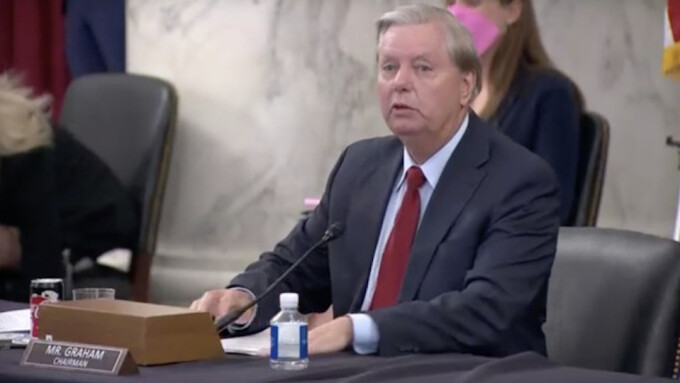WASHINGTON — Senator Lindsey Graham (R, South Carolina), Chairman of the Senate Committee on the Judiciary, quietly scheduled yesterday an item on the agenda for Thursday’s committee meeting, aiming to discuss a new bill, S. 4632, which he called the Online Content Policy Modernization Act.
Graham's new bill, which explicitly seeks to undermine the First Amendment based on a new notion of "objectionally reasonable belief," includes a change of wording that attempts to single out "material that the provider or user has an objectively reasonable belief is obscene, lewd, lascivious, filthy, excessively violent, harassing, or promoting self-harm, promoting terrorism, or unlawful, whether or not such material is constitutionally protected.”
The Online Content Policy Modernization Act is yet another attempt by Graham to reform or revoke Section 230 protections, the so called “First Amendment of the Internet.” A previous Graham sponsored bill, the EARN IT Act, also aimed at Section 230, is making its way through the Senate, as are a few other proposals that Graham has praised.
Both Donald Trump and Joe Biden have expressed their wish to repeal Section 230, with the current president issuing a confusing Executive Order earlier in May that ordered federal agencies to find ways to challenge its protections.
According to the U.S. Constitution, only Congress has the power to alter or repeal Section 230.
A New Copyright Bureaucracy
Graham’s new Online Content Policy Modernization Act, which he previously called Online Freedom and Viewpoint Diversity Act, claims as its stated purpose to "establish an alternative dispute resolution program for copyright small claims, to amend the Communications Act of 1934 to modify the scope of protection from civil liability for ‘good Samaritan’ blocking and screening of offensive material, and for other purposes.”
Graham’s bill proposes the creation of a new federal bureaucracy under the Copyrights Office, the Copyright Claims Board. Graham’s new board will supposedly “serve as an alternative forum in which parties may voluntarily seek to resolve certain copyright claims regarding any category of copyrighted work, as provided in this chapter.”
This new form of government intervention would essentially tie third-party-upload content sites, from Facebook to Twitter to YouTube and adult tube sites, in endless litigations arbitrated by this new, politically appointed board.
Altering the Language (and Spirit) of Section 230
The last part of the bill directly changes language to Section 230 of the Communications Act of 1934 (47 22 U.S.C. 230), altering the current version — No provider or user of an interactive computer service shall be treated as the publisher or speaker of any information provided by another information content provider — with the following:
(A) IN GENERAL.—No provider or user of an interactive computer service shall be treated as the publisher or speaker of any information provided by another information content provider.
‘(B) APPLICABILITY.—
(i) IN GENERAL.—Subparagraph (A) shall not apply to any decision or agreement made or action taken by a provider or user of an interactive computer service to restrict access to or availability of material provided by another information content provider.
(ii) CIVIL LIABILITY.—Any applicable immunity for a decision or agreement made or action taken by a provider or user of an interactive computer service described in clause (i) shall be provided solely by paragraph (2).’
That paragraph (2) currently reads:
No provider or user of an interactive computer service shall be held liable on account of
(A) any action voluntarily taken in good faith to restrict access to or availability of material that the provider or user considers to be obscene, lewd, lascivious, filthy, excessively violent, harassing, or otherwise objectionable, whether or not such material is constitutionally protected; or
(B) any action taken to enable or make available to information content providers or others the technical means to restrict access to material described in paragraph (1).
Graham’s new bill would amend paragraph (2) as follows:
(A) any action voluntarily taken in good faith to restrict access to or availability of material that the provider or user has an objectively reasonable belief is obscene, lewd, lascivious, filthy, excessively violent, harassing, or promoting self-harm, promoting terrorism, or unlawful, whether or not such material is constitutionally protected; or
(B) any action taken to enable or make available to information content providers or others the technical means to restrict access to material described in paragraph
A further change of language is directly aimed at recent attempts by Twitter and Facebook to fact-check information disseminated via their platform. Graham wants to make them liable as “being responsible in whole or in part for the creation or development of information.”
Graham's 'Objectively Reasonable Belief'
For the adult industry, the most concerning change is Graham’s new definition of “material that the provider or user has an objectively reasonable belief is obscene, lewd, lascivious, filthy, excessively violent, harassing, or promoting self-harm, promoting terrorism, or unlawful, whether or not such material is constitutionally protected.”
Graham’s bill essentially seeks to end First Amendment protections based on something being declared “unlawful” and, more specifically, creates a new, incredibly vague legal category of “objectively reasonable belief,” and directly applies it to the words “obscene, lewd, lascivious, filthy.”
The enormous danger in the fact that Graham is now seeking to write legislation enshrining belief as “objective” — and that what he considers “obscene, lewd, lascivious, filthy” does not need to be spelled out.







